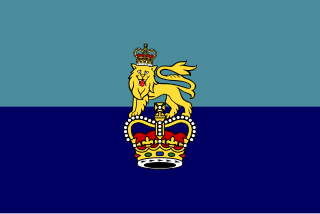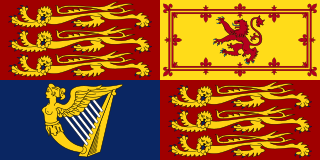
The Admiralty was a department of the Government of the United Kingdom responsible for the command of the Royal Navy until 1964, historically under its titular head, the Lord High Admiral – one of the Great Officers of State. For much of its history, from the early 18th century until its abolition, the role of the Lord High Admiral was almost invariably put "in commission" and exercised by the Lords Commissioner of the Admiralty, who sat on the governing Board of Admiralty, rather than by a single person. The Admiralty was replaced by the Admiralty Board in 1964, as part of the reforms that created the Ministry of Defence and its Navy Department.

The Air Ministry was a department of the Government of the United Kingdom with the responsibility of managing the affairs of the Royal Air Force, that existed from 1918 to 1964. It was under the political authority of the Secretary of State for Air.

The Ministry of Defence is a ministerial department of the Government of the United Kingdom. It is responsible for implementing the defence policy set by the government and serves as the headquarters of the British Armed Forces.

The First Sea Lord and Chief of the Naval Staff (1SL/CNS) is a statutory position in the British Armed Forces usually held by a four star admiral. As the highest-ranking officer to serve in the Royal Navy, the chief is the principal military advisor on matters pertaining to the navy and a deputy to the Secretary of State for Defence. In a separate capacity, the CNS is a member of the Chiefs of Staff Committee and, thereby, a military advisor to the National Security Council, the prime minister and the monarch. The First Sea Lord is typically the highest-ranking officer on active duty of the Royal Navy unless the Chief of the Defence Staff is a naval officer. Admiral Ben Key was appointed First Sea Lord in November 2021.

The Second Sea Lord and Deputy Chief of Naval Staff is deputy to the First Sea Lord and the second highest-ranking officer to currently serve in the Royal Navy and is responsible for personnel and naval shore establishments. Originally titled Second Naval Lord in 1830, the post was restyled Second Sea Lord in 1904. They are based at Navy Command, Headquarters.

The Air Force Board of the Defence Council is responsible for the management of the Royal Air Force.
A private secretary (PS) is a civil servant in a governmental department or ministry, responsible to a secretary of state or minister; or a public servant in a royal household, responsible to a member of the royal family.

The Board of Admiralty (1628–1964) was established in 1628 when Charles I put the office of Lord High Admiral into commission. As that position was not always occupied, the purpose was to enable management of the day-to-day operational requirements of the Royal Navy; at that point administrative control of the navy was still the responsibility of the Navy Board, established in 1546. This system remained in place until 1832, when the Board of Admiralty became the sole authority charged with both administrative and operational control of the navy when the Navy Board was abolished. The term Admiralty has become synonymous with the command and control of the Royal Navy, partly personified in the Board of Admiralty and in the Admiralty buildings in London from where operations were in large part directed. It existed until 1964 when the office of First Lord of the Admiralty was finally abolished and the functions of the Lords Commissioners were transferred to the new Admiralty Board and the tri-service Defence Council of the United Kingdom.

The Ministry of Defence is a Ministry of the Federal Government of Nigeria with the statutory responsibility of overseeing and supervising the Nigerian Armed Forces. The Ministry of Defence is headed by the Minister of Defence, a cabinet-level head who reports directly to the President of the Federal Republic of Nigeria. Its main mission is to provide administrative and support services, timely and effectively to enable the Armed Forces of the Federal Republic of Nigeria.

The Ministry of Defence was a department of the British Government responsible for defence and the British Armed Forces.

The Navy Command is the current headquarters body of the Royal Navy, and as of 2012 its major organisational grouping. It is a hybrid, neither a command, nor simply an installation. Royal Navy official writings describe Navy Command Headquarters both as a physical site, on Whale Island, Hampshire, a collective formed of the most senior RN officers, and as a budgetary grouping.

Head of the Armed Forces is the position of the sovereign of the United Kingdom as commander-in-chief of the British Armed Forces. However, supreme military authority has been delegated by the monarch to the Defence Council of the United Kingdom, a body officially charged with the direction and administration of the Armed Forces.

The Ministry of Defence (MINISDEF) is the department of the Government of Spain responsible for planning, developing and carrying out the general guidelines of the Government about the defence policy and the managing of the military administration. It is the administrative and executive body of the Spanish Armed Forces.

The Assistant Chief of the Naval Staff (A.C.N.S.) is a senior appointment in the Royal Navy usually a two-star rank and has a NATO ranking code of OF-7.

The Deputy Chief of the Naval Staff (DCNS) is a senior appointment in the Royal Navy currently held by the Second Sea Lord. The incumbent is usually a three-star rank and had a NATO ranking code of OF-8, but the position has previously been held by an acting two-star ranked officer and a four-star ranked officer.
The Navy Board is the body responsible for the day-to-day running of His Majesty's Naval Service. Its composition is similar to that of the Admiralty Board of the Defence Council of the United Kingdom, except that it does not include any of His Majesty's Ministers. The Board shares a name with its historic predecessor, the Navy Board of 1546 to 1832, but is unrelated in structure or membership.

The Admiralty War Staff was the former senior naval staff operational planning organisation within the British Admiralty that existed from 1912 to 1917. It was instituted on 8 January 1912 by Winston Churchill in his capacity as First Lord of the Admiralty and was in effect a war council whose head reported directly to the First Sea Lord. After the First World War ended, the War Staff was replaced by the Admiralty Naval Staff department.

The Department of the Permanent Secretary also formally known as the Department of the Permanent Secretary to the Admiralty or the Department of the Secretary was the Civil Service department responsible for the control, direction and guidance of all administrative functions of the British Admiralty from 1702 to 1964, it was headed by the Permanent Secretary to the Admiralty.

The Naval Staff Directorate is a military staff directorate created in 1985 as the Directorate of Naval Staff Duties. The directorate was originally part of the British Ministry of Defence and is now under the Ministry of Defence as part of Navy Command. It is currently administered by the Commodore Naval Staff now based at MOD HQ.

The Navy Department was a former ministerial service department of the British Ministry of Defence responsible for the control and direction of His Majesty's Naval Service. It was established on 1 April 1964 when the Admiralty was absorbed into a unified Ministry of Defence, where it became the Navy Department. Political oversight of the department originally lay with the Minister of Defence for the Royal Navy (1964-1967) it then passed to the Parliamentary Under-Secretary of State for Defence for the Royal Navy (1967–1981), then later to the Parliamentary Under-Secretary of State for the Armed Forces (1981-1990), and finally the Parliamentary Under-Secretary of State for Defence (1991–1997).










